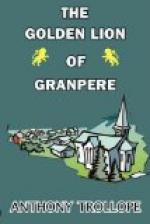‘Yes; I know whom she means.’
‘Who is it then, M. Voss?’
‘It is George, of course,’ replied the innkeeper.
‘I did not know,’ said poor Adrian Urmand.
’She never spoke a dozen words to any other man in her life, and as for him, she has hardly seen him for the last eighteen months. He has come over and said something to her, like a traitor,—has reminded her of some childish promise, some old vow, something said when they were children, and meaning nothing; and so he has frightened her.’
‘I was never told that there was anything between them,’ said Urmand, beginning to think that it would become him to be indignant.
‘There was nothing to tell,—literally nothing.’
‘They must have been writing to each other.’
’Never a line; on my word as a man. It was just as I tell you. When George went from home, there had been some fooling, as I thought, between them; and I was glad that he should go. I didn’t think it meant anything, or ever would.’ As Michel Voss said this, there did occur to him an idea that perhaps, after all, he had been wrong to interfere in the first instance,—that there had then been no really valid reason why George should not have married Marie Bromar; but that did not in the least influence his judgment as to what it might be expedient to do now. He was still as sure as ever that as things stood now, it was his duty to do all in his power to bring about the marriage between his niece and Adrian Urmand. ’But since that, there has been nothing,’ continued he, ’absolutely nothing. Ask her, and she will tell you so. It is some romantic idea of hers that she ought to stick to her first promise, now that she has been reminded of it.’
All this did not convince Adrian Urmand, who for a while expressed his opinion that it would be better for him to take Marie’s refusal, and thus to let the matter drop. It would be very bitter to him, because all Basle had now heard of his proposed marriage, and a whole shower of congratulations had already fallen upon him from his fellow-townspeople: but he thought that it would be more bitter to be rejected again in person by Marie Bromar, and then to be stared at by all the natives of Granpere. He acknowledged that George Voss was a traitor; and would have been ready to own that Marie was another, had Michel Voss given him any encouragement in that direction. But Michel throughout the whole morning,—and they were closeted together for hours,—declared that poor Marie was more sinned against than sinning. If Adrian was but once more over at Granpere, all would be made right. At last Michel Voss prevailed, and persuaded the young man to return with him to the Lion d’Or.
They started early on the following morning, and travelled to Granpere by way of Colmar and the mountain. The father thus passed twice through Colmar, but on neither occasion did he call upon his son.




